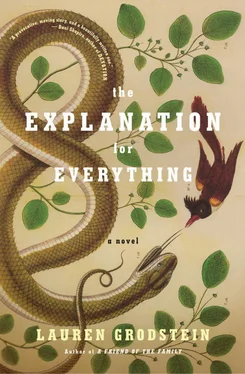Lou had left her cell phone on the kitchen counter. In the bedroom, Belle slept like an angel.
When she didn’t come home after a half hour he started to worry and when she didn’t come home in an hour he called the police but nobody could give him any real information although yes, there had been an accident on Eighty-seventh, yes, a Mazda, and that’s when he banged on the door next door, that nice old Jewish couple who sometimes invited Rachel over to light Shabbat candles, and Rona Katz told him to calm down, not to worry, but it was too late, she was in his living room and he was out the door speeding speeding toward the intersection of Eighty-seventh and Manor by the entrance to Route 1.
There were orange cones, flare lights, traffic. He pulled the car into the parking lot at Blockbuster, got out, ran ran ran ran ran out of breath kept running to the accident, the McDonald’s across from the Steak ’n Shake, yes, he knew what he was going to see, and there it was: the ambulance, Oliver McGee, the drunk kid from the complex, on a stretcher, their Mazda crushed like a can, his wife still in that crushed Mazda since the doors were accordioned shut and there was no way she’d have been able to get out. There was no way anyone could get her out. He raced to the door. Her head slammed against the windshield. The cops pulled him away. On the seat, blood and brain.
BUT IN HIS dreams, both erotic and scientific, she was perfect. She was whole. It was Lou’s body that came to him even more than her voice, which was surprising: in life, although her appearance had been the first draw, soon enough it was her conversation that kept him interested, generous and mordantly funny. She liked dirty jokes. Before the girls were born she’d read long-winded fantasy novels featuring magic dwarves and big-breasted sorceresses. She was impatient with everybody, especially in Florida, where people talked too slow, and usually in check-out lines. When he was pressed into servitude as a teaching assistant in Human Anatomy, she came with him to the cadaver lab, looked at the splayed-open bodies with an appraising eye, remembered fondly her own days in nursing school, and said, “Catch!” pretending to throw him a human eyeball. She wasn’t even wearing gloves.
She’d had such a beautiful body. It worked so beautifully, the choreography of her limbs, the delicate threading of her arteries and veins, the miracle of her vision, iris through lens through retina through optic nerve to the visual cortex in her pulsing splattered brain. And deep inside her smooth freckled belly—if he peered there, put his head against her soft warmth—he could almost see the uterus, the fallopian tubes, the ova, their children.
The night of the accident, an ambulance took Lou’s body away to the morgue, and Andy returned home to his children. Rona Katz was sitting in his kitchen, playing Go Fish with Rachel, who was still awake.
“Daddy? What took you so long? Where’s Mommy?”
Rona Katz looked at him, and her face seemed to turn gray. She returned to the deck of cards, began straightening them.
“Rachel,” he said. “I love you very much.”
Rona bent her head at his kitchen table.
“Your mother is not coming home,” he said. The story of the rest of his life.
ANDY SAT AT this new kitchen table, this new house, and tried to draft his statement to the parole board. Oliver McGee had been sentenced to eight to twelve years; he would have gotten more except that Lou hadn’t yet clicked on her seat belt. Otherwise he might have gotten twenty.
As it was, this was Oliver’s third arrest for drunk driving (and after the trial everyone told Andy—and what was he supposed to do with this information, exactly?—everyone told him it had just been a matter of time). Only eight to twelve and already it had been six and already he was up for parole for the third time. As he had the first two times, Andy spent hours drafting the right kinds of words to the parole board, not hysterical, not vindictive, but rather the calmly plaintive words of a man who had lost his beloved wife to Oliver McGee’s driving and couldn’t bear the thought of the same thing happening to anyone else.
He’d expected these statements would get easier to write, but in fact this time it was harder. He’d already used his best material the first two times. This current iteration was taking him hours; the simplicity of his object kept slipping away from him. Frustratingly, these were hours he should have spent preparing his tests, or reading his journals, or even sleeping. He would have been sleeping, maybe, if it weren’t for the recent spate of troubling dreams. But instead, it was midnight, and here he was, the letter, the purposeful nature of the letter, slipping away again and again in a steaming pile of words. And tomorrow it would be five thirty, and here he’d be again.
Oliver McGee had been his neighbor in the Quail Run apartment complex. Nineteen, living with his mother and grandmother in one of the end-unit town houses, supposedly finishing high school but Andy saw him all the time on weekday mornings, sprawled out on one of the benches by the swimming pool, snoring a drunken snore. Complaints were made to management but what could they do? They ushered him off the benches. They let him get drunk, quietly, inside his own town house. His mom and grandma both worked but the television was on all day, every day; Andy heard it as he walked to his apartment. Sometimes, at night, Oliver would speed out of the parking lot, flying over speed bumps like Evel Knievel.
“That kid’s going to kill himself one day,” Andy said, watching Oliver from his kitchen window, spinning out into the night.
“If he’s lucky,” Lou said. “If he’s not he’ll kill somebody else.”
During the trial, the mother and the grandmother were heartbroken not only for Andy and the girls but also, of course, for Oliver, who in the way of these things had once been a pretty nice kid. He used to like to skateboard, evidently. He used to be a pretty good artist. The character witnesses included his former high school art teacher but even the teacher had to admit that Oliver’s performance started to suffer once he began drinking vodka out of Poland Spring bottles in class.
After the accident, Andy decided to turn his research away from degenerative disease and instead toward the mechanisms of alcoholism. He applied for and received a new postdoc with a biologist who was decoding brain waves in rats. Every day, at the lab, he would scrutinize the electroencephelograms of rats who had been dosed with varying amounts of ethanol, rats with different levels of different neuropeptides coursing through their brains. The goal of the research was to measure the way the different genetic makeups protected rats against intoxication. One of the sponsors of the research was a drug manufacturer who was trying to find the holy grail, medication that could ward off the effects of drink.
What would the royalties look like on that patent? A pill you could take before you left the bar, diminishing the effect of whatever you’d just imbibed, refocusing your mind so you could take the wheel. A pill that would let you get crazy on the dance floor, then go to work the next day clear-eyed and levelheaded. Andy and his colleagues called it the Margaritapill. Other labs were making some headway on this—dihydromyricetin looked promising—and the drug company gave his lab millions to try to catch up. Not that Andy himself was fueled by imagined riches. His fuel came from somewhere murkier—to understand, to know what to blame.
He was hired a year later at Exton Reed, a college he’d never heard of, on the strength of his coauthored papers, and his research was the object of some fascination during his interview. “So tell me, Andy,” said Linda Schoenmeyer, an ornithologist who’d never had anything to do with rodents. “How exactly do you give an EEG to a rat? Do you have, like, tiny little sensors? Do you have to shave their little heads?”
Читать дальше












